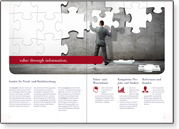Meter and metering infrastructure
The processes of consumption billing are seen as the main means to collect revenues by energy suppliers. However, the particular sub-processes are engrained into the suppliers' conscience on a very different level. The growing liberalisation of the energy branch confronts companies with rising demands and a higher complexity by the multiplication of trade and therefore contract relations on a process and organisational level. In the face of liberalisation, companies experience a high vertical integration of processes on the sub-process level, complicating organisational structures in the future. The modified technologies bear the potential of being either driving forces (e.g. remote metering) or debilitating cost factors (e.g. IS-U).
After the liberalisation of metering a similar development in measuring can be expected in a medium-term time frame. Energy suppliers have to find a balance between service and low costs in the bulk business in order to stay competitive on a long-term basis. One challenge is posed by the emerging area of conflict between customer service and bad debt loss. In this context, measures of active customer retention and acquisition, but also an effective claims management become more and more important.
In the areas of accountancy, metering and customer service, the rising number of spin-offs of accountancy and shared service providers of energy suppliers is a major trend to save costs. However, the current competition between providers in the full-service sector is not well-developed as opposed to particular sub-processes where competition is already very strong.
As a reaction to the liberalisation of metering, more and more companies position themselves as measuring point operators in order to prepare for the liberalisation of measuring well in advance. One of the arising questions is whether the meter is allocated to the grid or the distributor. This question has to be solved individually and can not be clarified clearly. By the means of a shortening of cycles, due to the current efficiency discussions on federal and EU-level, a massive, exogenic shock threatens measuring point operators and energy suppliers, since additional costs may arise for them. Therefore, energy suppliers have to adjust their processes well in advance to avoid possible strains.
